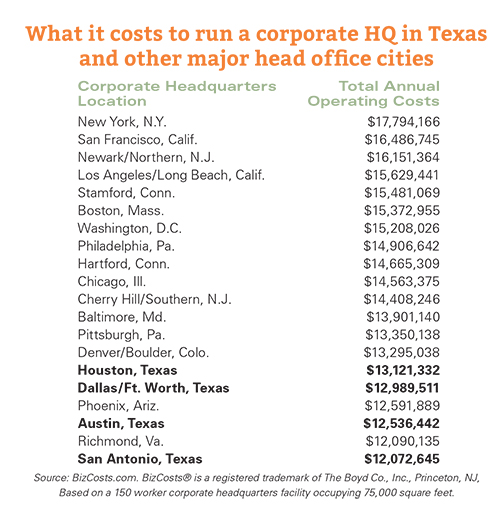In February 2014, Occidental Petroleum Chemicals, number 125 on the Fortune 500 list at the time, announced the company was moving its corporate headquarters from Los Angeles to Houston where Occidental already had a large footprint. “Occidental Petroleum is the largest oil producer in Texas and one of the largest in the nation,” said Governor Rick Perry. “It seems only fitting the company would locate its headquarters in Houston, the Energy Capital of the World.” The Houston headquarters will house the company’s oil and gas exploration and production operations in the Permian Basin and other parts of Texas, the Middle East and Colombia, as well as a midstream and marketing segment and a chemical subsidiary, OxyChem.
The move by Occidental may have been helped along by Perry’s two business recruitment visits to California in 2013, each preceded by a week-long, statewide media blitz touting the benefits of doing business in the Lone Star State. Then again, Occidental may have simply figured over 50 Fortune 500 companies already make their home in Texas, why not join them?
”
Our site-seeking clients, especially those relocating their head offices, want easy access to a major hub airport with strong national and international connections.“
– John H. Boyd, Principal, The Boyd Company, Inc
While the majority of the more than fifty Fortune 500 headquarters located in Texas are energy-related companies like Occidental, the list include an assortment of industries from airlines to consumer goods and food products, from health care to electronics. Houston leads the way with twenty-six Fortune 500 headquarters followed by the Dallas-Fort Worth Metroplex (18), San Antonio (5), Austin (2), and Corpus Christi and El Paso (1). And it’s not just the Fortune 500s making their way to Texas, plenty of companies of all sizes choose to make the state their corporate home.
Texas Scores High on the HQ Matrix
What makes Texas so darned attractive? According to John H. Boyd, a site selection professional and principal of The Boyd Group, Inc., the state scores high in all five typical factors looked at by companies and site selectors – talent, accessibility, lifestyle, incentives and operating costs.
- Talent: “The Texas workforce represents a deep and high growth talent pool for our relocating clients,” Boyd says. Computer giant and Boyd client, Dell, is headquartered in the state’s capital, Austin. The company thrives due in part to the presence of a world-class research university, the University of Texas, and distinctive quality of life and vibe of the city. “Austin is an easy relocation sell for our clients, especially those in the tech sector,” adds Boyd, tipping his cap to AustinTechSource.com, an online talent community that recruits high-quality tech talent from around the world. “I know our Dell client has benefited from this successful outreach program.” Likewise, companies in the Dallas-Fort Worth region draw heavily on the talent from the University of North Texas at Denton which is home to one of the leading data security programs in the county and a National Security Administration designated center of excellence in information assurance. Houston has a legacy of producing talented workers for the Johnson Space Center, multiple energy companies and a world renowned medical complex.
-

River Walk in San Antonio, Texas.
Photo by VideoLens.tv - Accessibility: In terms of headquarters, Texas has what companies look for. “Our site-seeking clients, especially those relocating their head offices, want easy access to a major hub airport with strong national and international connections,” says Boyd. “The common denominator in the impressive corporate headquarters success rate of Atlanta, Dallas and Charlotte, Chicago and Houston, e.g., are their airports.” Another plus, the state’s central location means approximately three hours of flying time to either coast.
- Lifestyle: Whether companies are looking for a good place for families or a cool city for young, upwardly mobile professionals, Texas has it covered. Austin, home to the annual SXSW Music/Film/Interactive Media festivals, is an international showcase for the city. San Antonio is home to the River Walk, a vibrant downtown park featuring shops, restaurants and other attractions that appeal to residents and tourists alike. Cities throughout Texas offer a wide assortment professional sports franchises.
- Incentives: All things being equal in a relocation deal, incentives like tax reductions or exemptions can help sweeten the deal. Programs like the Texas Enterprise Fund (TEF) has been instrumental in assisting companies pare down the costs associated with moving a headquarters.
- Operating Costs: As a result of the sluggish economic recovery and a more global outlook by clients when examining competitive cost structures, Boyd says operating costs have gained the most in importance in recent years. He calls operating costs the “white hot issues in today’s corporate boardrooms.” Cities offering a better bottom line enjoy a distinct advantage. Major cities in Texas major cities offer some of the most attractive operating cost structures in the US.

Las Colinas, Irving’s business district, is the largest office park in North Texas. Irving is home to five Fortune 500 corporate headquarters: Exxon, Fluor, Kimberly-Clark, Commercial Metals and Celanese.
Photo courtesy of ICVB
The HQ Sector Flourishes
 Located on a 280-acre campus on the northwest side of San Antonio is the corporate home of USAA, a financial services giant serving 10.1 million members made up primarily of military members and their families. The company, which employs 16,400 in San Antonio, announced in late 2013 that they are adding 3,000-plus employees at the headquarters over the next three years. In April 2014, USAA announced it was relocating 150 employees to San Antonio’s urban core.
Located on a 280-acre campus on the northwest side of San Antonio is the corporate home of USAA, a financial services giant serving 10.1 million members made up primarily of military members and their families. The company, which employs 16,400 in San Antonio, announced in late 2013 that they are adding 3,000-plus employees at the headquarters over the next three years. In April 2014, USAA announced it was relocating 150 employees to San Antonio’s urban core.
San Antonio is also home to Rackspace, a global leader cloud computing. The company, which was founded in 1998, serves hundreds of thousands of customers, operates data centers on four continents and was recently ranked 29th on Fortune’s list of 100 Best Companies to Work For.
”
Pro-business and low-cost Texas will continue to see more than its share of these new corporate headquarters relocation projects.“
– John H. Boyd, Principal, The Boyd Company, Inc.
The state’s capital city, Austin, is home to two Fortune 500 corporate headquarters, Dell and Whole Foods, but many other companies are drawn to the vibrant city. Websense, a San Diego-based global cybersecurity firm, will move its headquarters to Austin investing over $9.9 million and creating 445 new jobs. “We are expanding our presence into Austin because it represents an energetic, high-technology hub that will further enable us to meet growing demand for our technology and better serve our global customer base,” said Websense CEO John McCormack. The state provided $4.5 million through the TEF to close the deal.
”
We are expanding our presence into Austin because it represents an energetic, high-technology hub that will further enable us to meet growing demand for our technology and better serve our global customer base.“
– Websense CEO John McCormack
Abadak, another transplant from California, broke ground on a new headquarters and warehouse in Weir, north of Austin, in August 2013. The company is a leading tarp and canopy tent supplier. In addition to the headquarters and 100,000 square foot warehouse operations, Abadak intends to open a retail store. In March 2013, Conifer Healthcare Solutions in Frisco announced it was doubling its space and its workforce, adding 500 new jobs to its headquarters and service center.
For a city with a population just over 200,000, Irving punches above its weight when it comes to corporate headquarters. The city is home to five Fortune 500 headquarters including ExxonMobil, the oil company in the number one spot. In 2013, the Dallas Cowboys announced it would relocate its corporate headquarters in Irving and the city recently welcomed several smaller headquarters, including Cagney Global Logistics, moving from Denver; Cheddar’s Casual Café, a growing restaurant chain based in neighboring Las Colinas; and Taylor-Deal Aviation, a Dallas-based aviation firm that decided to consolidate its operations under one roof.
Texas is on track to continue and grow its ability to attract corporate headquarters. “This pace will continue, indeed, accelerate over the next several years based what our clients are telling us,” Boyd says. “As our cost-conscious clients continue to examine their bottom line in response to global competition and the slow economic recovery, their focus is increasingly turning to the remaining piece of the restructuring equation: the corporate headquarters site. Pro-business and low-cost Texas will continue to see more than its share of these new corporate headquarters relocation projects.”

